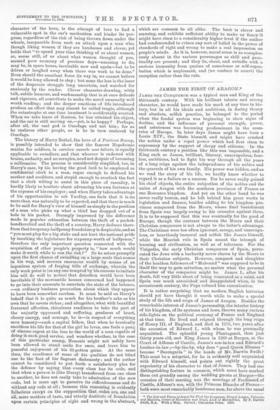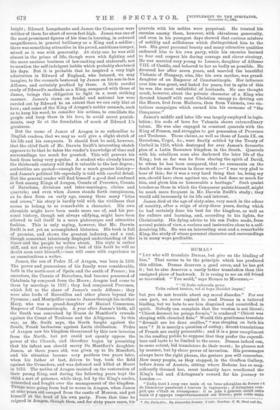JAMES THE FIRST OF ARAGON.* JAMES THE COMQ,ITEROB was a
typical man and King of the thirteenth century. With his brilliant talents and strong character, he would have made his mark at any time in his- tory, but in all his ideals and ambitions, in daring theory and absolute, selfish practice, he belonged to the period when the feudal system was beginning to show signs of decline, and the influence of personal strength, power, and astuteness was becoming predominant in the coun- tries of Europe. In later days James might have been a Louie XIV., the State himself, and might have crushed the nobles under a royal power which had first risen to supremacy by the support of clergy and citizens. In the thirteenth century a position like this was impossible, and a King such as James, brilliant, literary, unscrupulous, fear- less, ambitious, had to fight his way through all the years of a long reign against the independence of his nobles and the quarrels of his own family. His power was hidden, and as we read the story of his life, we hardly know whether to regard it as a failure or a success. For he never really gained his chief objects, the entire subjection of the nobles and the union of Aragon with the southern provinces of France as one Romance kingdom. And yet on the other hand he was never really beaten, and he left behind him great works in legislation and finance, besides adding to his kingdom pro- vinces conquered from the Moors, whose final banishment from Spain was largely owing to his crusades against them. It is to be supposed that this was eventually for the good of Europe, though the contrast between the Moors and their Christian conquerors is not always to the latter's advantage. The Christians were too often ignorant, savage, and unscrupu- lous, or heartlessly immoral and selfish like James himself, while the Moorish rule in Spain meant the triumph of learning and civilisation, as well as of tolerance. For the Visigoths, the early Christian conquerors of Spain, perse- cuted the Jews with a barbarity never shown by the Moors to their Christian subjects. However, conquest and slaughter of the heathen followers of "Mahound" was supposed to be in itself the way to gain salvation, no matter what the personal character of the conqueror might be. James I., after his death, fell very little short of being venerated as a saint, and Spain was much astonished and disappointed when, in the seventeenth century, the Pope refused him canonisation.
It is rather surprising that no modern English historian should yet have thought it worth while to make a special study of the life and reign of James of Aragon. Besides the remarkable interest of James's personality, the interior history of his kingdom, of its systems and laws, throws many curious side-lights on the political economy of France and England at that time. He lived and reigned through the long reign of Henry III. of England, and died in 1276, two years after the accession of Edward I., with whom he was personally acquainted. The splendid young Plantagenet, then just thirty years old, met King James in 1269 at Burgos, at the Court of Alfonso of Castile, James's son-in-law and Edward's brother-in-law ;—by-the-by, why does "good Queen Eleanor" become " Berengaria " in the hands of Mr. Darwin Swift P This must be a misprint, for he is evidently well acquainted with Edward himself, and points out rightly the great superiority of his character to that of James. They had one distinguishing feature in common, which must have marked them out grandly among the wedding guests at Burgos—the occasion of their meeting was the marriage of Ferdinand of Castile, Alfonso's son, with the Princess Blanche of France— both were most remarkably handsome men, far above the usual • The Life and Times of 614711013 tho First the Conqueror, King of Aragon, Valencia, and Maioroa. Count of liarceiong and Urge; Lord- of Montpellier. By F. Darwin swift, B,A. With a Map. Word,: Olarendon Prom 1894. height ; Edward Longshanks and James the Conqueror were neither of them far short of seven feet high. James was one of the most prominent figures of his time in learning, in outward magnificence, in general brilliancy as a King and a soldier ; there was something attractive in his proud, ambitious temper, mixed as it was with generosity. At sixty-one he was still almost in the prime of life, though worn with fighting and the more anxious business of law-making and statecraft, not to mention the self-indulgent habits which probably shortened his days. But it is probable that he inspired a very high admiration in Edward of England, who listened, we may imagine, to the counsels bestowed by James on his son-in-law .A.1fonso, and certainly profited by them. A little careful study of Edward's methods as a King, compared with those of James, brings this obligation to light in a most striking manner. James's views on feudal and national law were carried out by Edward to an extent that we can only hint at here ; and some of the King of Aragon's nobler counsels, such as to keep his word, to consider his actions, to conciliate the people and keep them in his love, to avoid secret punish- ments, may lie at the foundation of much of Edward L's greatness.
But the name of James of Aragon is so unfamiliar to English readers, that we may as well give a slight sketch of hie life and his conquests. It should first be said, however, that the chief fault of Mr. Darwin Swift's interesting sketch appears to be that he takes the reader's knowledge of time and surroundings too much for granted. This will prevent his book from being very popular. A student who already knows the thirteenth century will find it valuable to the last degree ; authorities are quoted—enough for a much greater history— and James's political life especially is told with careful detail. But the general reader will find himself a good deal confused at first among Kings of Aragon, Counts of Provence, Counts of Barcelona, divisions and inter-marriages, claims and quarrels; and even when James stands forth conspicuous, as he does from an early age, among these many "kites and crows," his story is hardly told with the vividness that seems to belong to so remarkable a character. His own chronicle might have been made more use of, and his per- sonal history, though not always edifying, might have been allowed to tell itself in a more picturesque and attractive fashion. This is only saying, however, that Mr. Darwin Swift is not yet an accomplished historian. His book is full of promise, and shows the greatest industry, and a real, though somewhat laboriously displayed understanding of the times and the people he writes about. Hie style is rather stiff, and not always very clear; but of this fault he will no doubt soon cure himself,—ease will Male with experience to so conscientious a writer.
James, the son of Pedro II. of Aragon, was born in 1208. The power and possessions of his family were considerable, both in the north-east of Spain and the south of Prance; his ancestors, the Counts of Barcelona, had become possessed of Catalonia by conquest from the Moors ; Aragon had come to them by marriage in 1137; they had conquered Provence, which fell to the share of James's uncle Alfonso ; they were also lords of Roussillon and other places beyond the Pyrenees ; and Montpellier came to James through his mother Mary, who was a grand-daughter of Manuel Comnenus, Emperor of Constantinople. A year after James's birth, all the South was convulsed by Simon de Montfort's crusade against the Count of Toulouse and the Albigenses. In this war, as Mr. Swift says, the North fought against the South, Frank barbarism against Latin civilisation. Pedro of Aragon saw his kingdom threatened by this new invasion from the North, but yet could not openly oppose the power of the Church, and therefore began by promising that his infant son should marry De Montfort's daughter. James, at three years old, was given up to De Montfort, and his situation became very perilous two years later, when his father at last, driven to bay, took the field against the Crusaders, and was defeated and killed at Muret in 1213. The nobles of Aragon insisted on the restoration of their young King, and during the following years kept the child a sort of prisoner, while they, led by the King's uncles, quarrelled and fought over the management of the kingdom. Things were going from bad to worse in Aragon, when James at nine years old escaped from the castle of Monzon, and put himself at the head of his own party. From that time he reigned in Aragon, though then, and for sixty years more, his quarrels with his nobles were perpetual. He treated his enemies among them, however, with chivalrous generosity, and even in his youngest days showed that curious mixture of nobility and selfishness which distinguished him to the Inst. His great personal beauty and many attractive qualities endeared him to his own party, while his enemies learned to fear and respect his daring courage and clever strategy, He was married very young to Leonor, daughter of Alfonso VIII. of Castile, and behaved to her as badly as possible. He divorced her after seven years, and married the beautiful Violante of Hungary, who, like his own mother, was grand- daughter of an Emperor of Constantinople. Her influence over him was great, and lasted for years, but in spite of this he was the most unfaithful of husbands. No one thought much, however, about the private character of a King who devoted himself with most Christian energy to driving out the Moors, first from Mallorca, then from Valencia, two vic- torious campaigns which earned him his surname of "the Conqueror."
James's middle and later life was largely employed in legis- lation; his code of laws for Valencia shows extraordinary talent. He was also engaged in constant quarrels with the King of France, and struggles to get possession of Provence and Toulouse. These claims, as well as those of Louis IX. on Barcelona, ITrgel, &c., were finally settled by the Treaty of Corbeil in 1258, which destroyed for ever James's favourite plan of a Latin Romance kingdom in the South. Quarrels with his rebellious sons also darkened the later life of the King ; but so far was he from sharing the spirit of David, to whom he has been compared, that he comments on the death of his son Fernan in these words :—" I was very glad to hear of this; for it was a very hard thing that he, being my son, should have risen against me, who had done so much for him, and given him so honourable a heritage." Such quaint touches as these in which the Conqueror paints himself, might be much more frequent in Mr. Darwin Swift's study; they would add immensely to its life and interest.
James died at the age of sixty-nine, very much in the odour of sanctity, after a reign of sixty-three years, during which he had certainly done his best for the kingdom, as well as for culture and learning, and, according to his lights, for Christianity. His dying advice to his son Pedro made, from several points of view, a curious and instructive close to a self- deceiving life. He was an interesting man and a. remarkable King, the study of whose personal character and surroundings is in many ways profitable.



















































 Previous page
Previous page